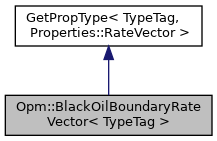Implements a boundary vector for the fully implicit black-oil model. More...
#include <blackoilboundaryratevector.hh>

Public Member Functions | |
| BlackOilBoundaryRateVector () | |
| Default constructor. More... | |
| BlackOilBoundaryRateVector (Scalar value) | |
| BlackOilBoundaryRateVector (const BlackOilBoundaryRateVector &value)=default | |
| Copy constructor. More... | |
| BlackOilBoundaryRateVector & | operator= (const BlackOilBoundaryRateVector &value)=default |
| template<class Context , class FluidState > | |
| void | setFreeFlow (const Context &context, unsigned bfIdx, unsigned timeIdx, const FluidState &fluidState) |
| Specify a free-flow boundary. More... | |
| template<class Context , class FluidState > | |
| void | setInFlow (const Context &context, unsigned bfIdx, unsigned timeIdx, const FluidState &fluidState) |
| Specify an inflow boundary. More... | |
| template<class Context , class FluidState > | |
| void | setOutFlow (const Context &context, unsigned bfIdx, unsigned timeIdx, const FluidState &fluidState) |
| Specify an outflow boundary. More... | |
| void | setNoFlow () |
| Specify a no-flow boundary for all conserved quantities. More... | |
| template<class Context , class FluidState > | |
| void | setThermalFlow (const Context &context, unsigned bfIdx, unsigned timeIdx, const FluidState &boundaryFluidState) |
| an energy flux that corresponds to the thermal conduction from More... | |
Detailed Description
class Opm::BlackOilBoundaryRateVector< TypeTag >
Implements a boundary vector for the fully implicit black-oil model.
Constructor & Destructor Documentation
◆ BlackOilBoundaryRateVector() [1/3]
|
inline |
Default constructor.
◆ BlackOilBoundaryRateVector() [2/3]
|
inline |
◆ BlackOilBoundaryRateVector() [3/3]
|
default |
Copy constructor.
- Parameters
-
value The boundary rate vector to be duplicated.
Member Function Documentation
◆ operator=()
|
default |
◆ setFreeFlow()
|
inline |
Specify a free-flow boundary.
- Parameters
-
context The execution context for which the boundary rate should be specified. bfIdx The local space index of the boundary segment. timeIdx The index used by the time discretization. fluidState The repesentation of the thermodynamic state of the system on the integration point of the boundary segment.
References Opm::BlackOilEnergyModule< TypeTag, enableEnergyV >::addToEnthalpyRate().
Referenced by Opm::BlackOilBoundaryRateVector< TypeTag >::setInFlow(), and Opm::BlackOilBoundaryRateVector< TypeTag >::setOutFlow().
◆ setInFlow()
|
inline |
Specify an inflow boundary.
An inflow boundary condition is basically a free flow boundary condition that is not prevented from specifying a flow out of the domain.
- Parameters
-
context The execution context for which the boundary rate should be specified. bfIdx The local space index of the boundary segment. timeIdx The index used by the time discretization. fluidState The repesentation of the thermodynamic state of the system on the integration point of the boundary segment.
References Opm::BlackOilBoundaryRateVector< TypeTag >::setFreeFlow().
◆ setNoFlow()
|
inline |
Specify a no-flow boundary for all conserved quantities.
Referenced by Opm::BlackOilBoundaryRateVector< TypeTag >::setThermalFlow().
◆ setOutFlow()
|
inline |
Specify an outflow boundary.
An outflow boundary condition is basically a free flow boundary condition that is not prevented from specifying a flow into the domain.
- Parameters
-
context The execution context for which the boundary rate should be specified. bfIdx The local space index of the boundary segment. timeIdx The index used by the time discretization. fluidState The repesentation of the thermodynamic state of the system on the integration point of the boundary segment.
References Opm::BlackOilBoundaryRateVector< TypeTag >::setFreeFlow().
◆ setThermalFlow()
|
inline |
an energy flux that corresponds to the thermal conduction from
an energy flux that corresponds to the thermal conduction from the domain boundary
This means that a "thermal flow" boundary is a no-flow condition for mass and thermal conduction for energy.
References Opm::BlackOilBoundaryRateVector< TypeTag >::setNoFlow().
The documentation for this class was generated from the following file: